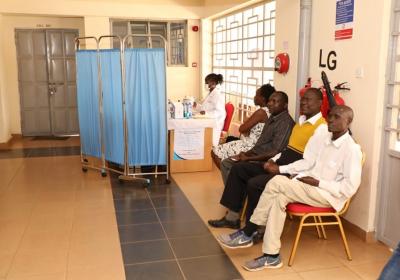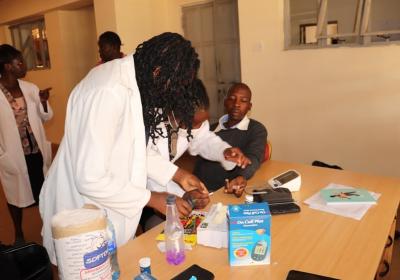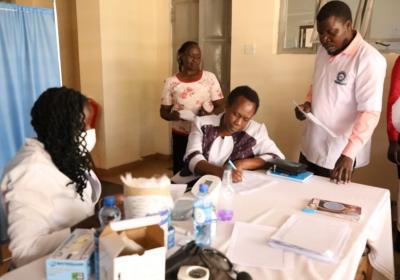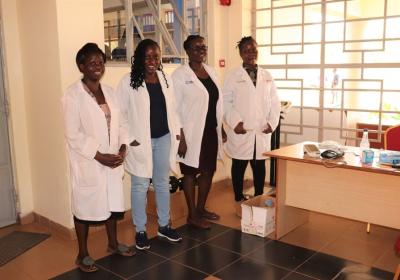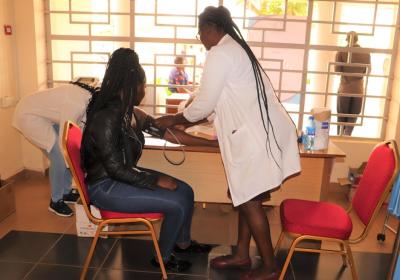A section of the MMUST healthcare workers poses for a group photo at one of the service stations.
MMUST’s Aids Control, Gender, and Disability Mainstreaming Unit have continued to champion HIV, Mental Health Awareness, and early screening of non-communicable diseases among the staff and students during the five-day annual exercise. The event dubbed, ‘Health Week’ took place at the main campus from 6th to 8th February, 2023 and extended to the Bungoma and Webuye campuses on 9th and 10th February 2023 respectively. This was aimed at providing an opportunity for the University fraternity to understand their health status, as well as to sensitize them on the need for the adoption of early screening as a method to counter the severity of given medical conditions by engaging in early treatment or intervention.
Speaking during the exercise, the Coordinator, AIDS Control, Gender and Disability Mainstreaming Unit, Prof. Gladys Mengich, expressed her joy over the turnout of the participants, saying that they surpassed this year’s expectations. Prof. Mengich emphasized the relevance of early screening and testing, stating that it is important to everyone since it enables early detection of disease in people who do not show any signs of the disease itself.
“Health screening can help an individual to find out if they have any underlying disease or condition or if they are at a high risk of developing the same, even if they feel healthy and do not exhibit any symptoms. The result, which is usually early detection, followed by treatment and good control of the condition in most instances results in better outcomes and lowers the risk of serious complications. Additionally, in some instances, patients have more treatment options, lower medical costs, and even higher chances of survival,” said Prof. Mengich.
While addressing the participants, one of the University’s Senior Clinician, Dr. Felix Ambuche, spoke extensively on cervical cancer and mental health. Dr. Ambuche noted that cervical cancer is preventable and curable upon early detection, yet it is still among the most common type of cancer claiming the lives of women across the world.
“Some of the risk factors for getting cervical cancer include; early sexual intercourse, multiple sexual partners, first family history of cervical cancer, and comorbidities such as HIV infections. However, enough research has not been conducted on the use of family planning as a cause for this novel disease, hence we cannot say for a fact that it causes cervical cancer,” said Dr. Ambuche.
According to the World Health Organization (WHO), Non-communicable diseases (NCDs) mainly cardiovascular diseases, diabetes, cancers, and chronic respiratory diseases are the leading cause of death worldwide. They represent 7 of the 10 main causes of death equivalent to 74% of all deaths globally, which includes more than 15 million people who die prematurely every year from a major NCD between the ages of 30 and 69 years; 85% of these premature deaths occur in low and middle-income countries.
As a result, Dr. Ambuche stressed the fact that Cancer is easier to treat when it is detected before it spreads throughout the body. He recommended a number of preventive measures, including screening at regular intervals which he says, are determined by the age and needs of every individual.
“Screening is very important as it helps in the identification of cancer-causing cells and allows for timely intervention. Women need to identify their age group and other factors such as the need to determine how often to get screened. It is recommended that women of ages 21 to 29 go for screening at least after every two years while those above 45 years, do the same yearly. This is because they are at a stage where there are high chances of any malignancy in the body beginning to erupt. If at any point, one was treated for Cervical Intraepithelial Neoplasia (CIN), a precancerous condition in which abnormal cells grow on the surface of an individual’s cervix, then they need to do screening after every six months,” he explained.
Research further indicates that mental health conditions including anxiety, stress, depression, and psychosis, as well as neurological and substance use disorders, account for a quarter of all non-fatal disease burden, and more than 700 000 people die as a result of suicide each year. In Kenya, it is estimated that one in every 10 people suffer from a common mental disorder and the number increases to one in every four people among patients attending routine outpatient services to be suffering from depression and anxiety disorders.
However, since the emergence of the COVID-19 pandemic, there has been an increasing appreciation of the value of mental health. In Kenya for instance, we saw the establishment of a Mental Health Taskforce in 2019, which has implemented a number of reforms to improve care for those with mental health conditions. MMUST, through the AIDS Control, Gender, and Disability Mainstreaming Unit, has come out strong to ensure that staff and students gain access to all-around services including gender issues, counseling, and disability mainstreaming. The University has continued to ensure the availability of a health team, which comprises doctors, counselors, and social workers who are highly professional and present for both staff and students.
HIV has continued to be a major global public health issue. According to the UNAIDS, progress in the prevention and treatment of HIV-infected patients is faltering around the world, putting millions of people in grave danger. Eastern Europe and Central Asia, Latin America, the Middle East, and North Africa have all seen increases in annual HIV infections over several years. UNAIDS further reveals that the pace of progress in reducing new HIV infections, increasing access to treatment, and ending AIDS-related deaths is slowing down. In 2021, 1.5 million people were newly infected with HIV, 38.4 Million people were living with HIV and 650 thousand people died of AIDS-related illnesses.
It is high time we take heed of the precautionary measures put in place to reduce the risk of spreading these illnesses. MMUST has taken a step in the right direction and we continue to encourage staff and students to be responsible for their health by knowing their HIV/AIDS status and screening for non-communicable diseases as frequently as possible. By doing this, the University will certainly curb the high prevalence of non-communicable diseases among staff and students and have a working population of healthy people who can deliver.




.jpg)
